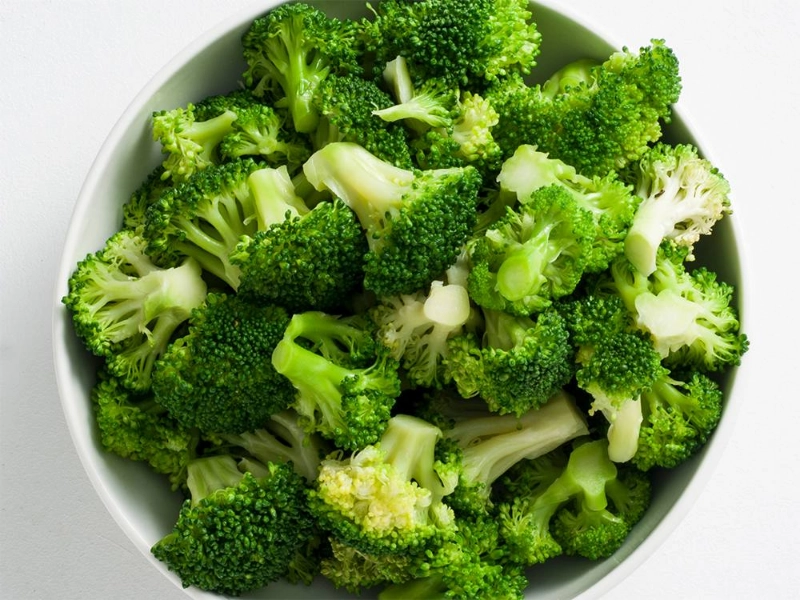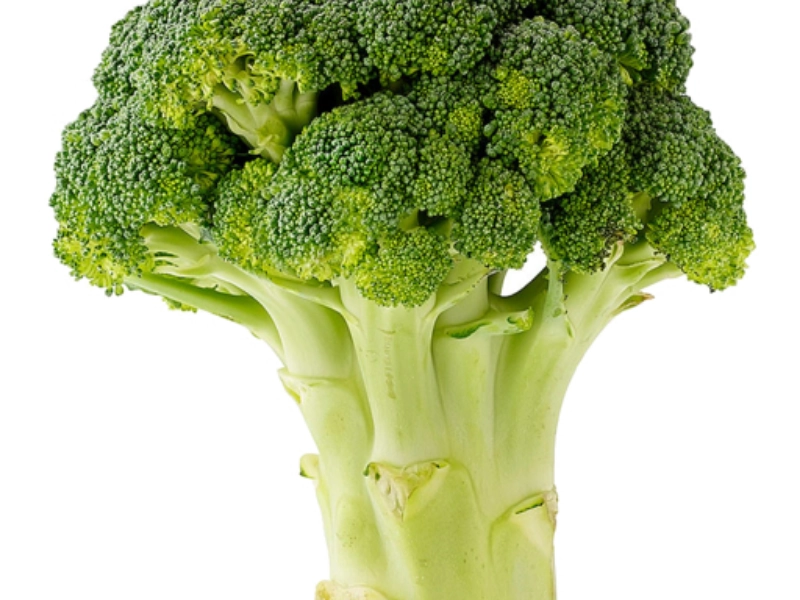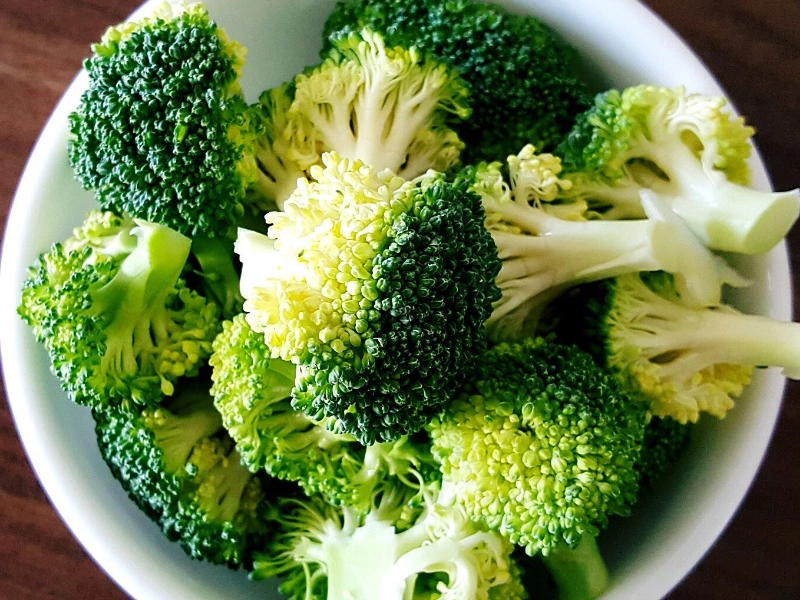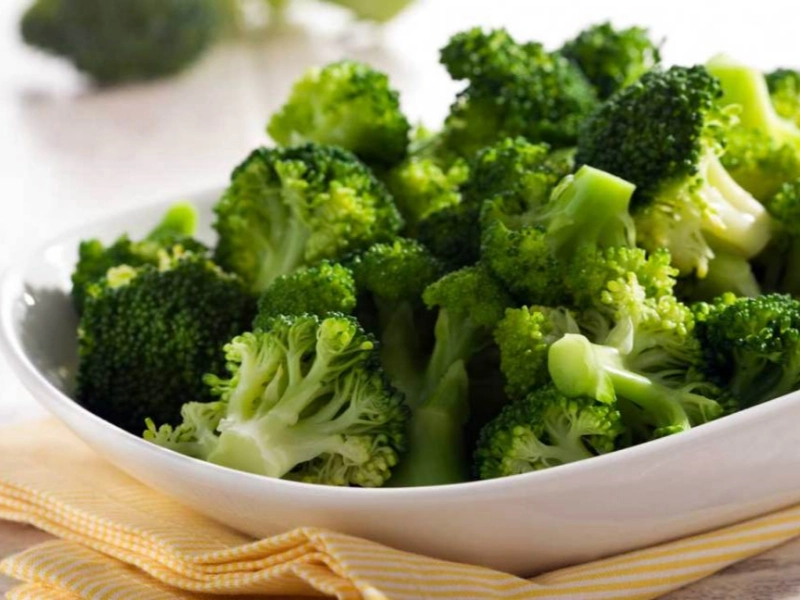Broccoli is a tasty vegetable that works well in a variety of recipes. You can roast, sauté, or steam it for dinner, or you can use it in casseroles and soups. This vegetable contains a high iron, calcium, and vitamin C content along with nutritional fibre. It has few calories as well. However, if you eat too much of it, it could irritate your digestive system and give you gas.

 It's possible that your parents were right when they advised you to "eat your broccoli." These green vegetables, which belong to the Brassica genus, which also includes cauliflower, cabbage, and Brussels sprouts, are rich in vitamins and minerals that are good for the body. Broccoli contains B-complex vitamins, vitamin C, folate, and potassium. The vegetable is a good source of flavonoid kaempferol and isothiocyanates, two types of antioxidants.
According to Live Science, these chemicals aid in the body's detoxification process by binding with specific toxic molecules. Broccoli, along with other cruciferous vegetables like cauliflower and cabbage, include sulforaphane, which aids the liver in eliminating toxins from the bloodstream.
Additionally, broccoli contains protein, which meets part of the body's requirement for this macronutrient (about 2% of the recommended daily amount for an adult). Broccoli is one of the cruciferous vegetables that people taking blood thinners should watch how much of since they contain phytochemicals that can reduce the effectiveness of anticoagulant medications.
It's possible that your parents were right when they advised you to "eat your broccoli." These green vegetables, which belong to the Brassica genus, which also includes cauliflower, cabbage, and Brussels sprouts, are rich in vitamins and minerals that are good for the body. Broccoli contains B-complex vitamins, vitamin C, folate, and potassium. The vegetable is a good source of flavonoid kaempferol and isothiocyanates, two types of antioxidants.
According to Live Science, these chemicals aid in the body's detoxification process by binding with specific toxic molecules. Broccoli, along with other cruciferous vegetables like cauliflower and cabbage, include sulforaphane, which aids the liver in eliminating toxins from the bloodstream.
Additionally, broccoli contains protein, which meets part of the body's requirement for this macronutrient (about 2% of the recommended daily amount for an adult). Broccoli is one of the cruciferous vegetables that people taking blood thinners should watch how much of since they contain phytochemicals that can reduce the effectiveness of anticoagulant medications.
 Broccoli is a member of the health-promoting Brassicaceae family, which also includes Brussels sprouts, cauliflower, and kale. It is an excellent source of calcium, fibre, manganese, folate, vitamin C, and vitamin K.
Indigestible fibre found in broccoli provides nourishment to the beneficial bacteria in your large intestine and facilitates their release of short-chain fatty acids that support a healthy flora in your gut. Additionally, it is a good source of compounds called isothiocyanate sulforaphane, which aid in the digestive system's defence against harmful intestinal bacteria.
Strong plant compound sulforaphane prevents the growth of cancer by improving your body's detoxification processes and preventing the production of malignant cells (5). Because vitamin C neutralises free radicals and stops their harmful effects, it also helps reduce oxidative stress (6).
Folate, often known as vitamin B9, is abundant in broccoli and is particularly beneficial to expectant mothers. Frequent folate intake promotes regular cell and tissue growth and helps to guarantee a healthier pregnancy result.
Broccoli is a member of the health-promoting Brassicaceae family, which also includes Brussels sprouts, cauliflower, and kale. It is an excellent source of calcium, fibre, manganese, folate, vitamin C, and vitamin K.
Indigestible fibre found in broccoli provides nourishment to the beneficial bacteria in your large intestine and facilitates their release of short-chain fatty acids that support a healthy flora in your gut. Additionally, it is a good source of compounds called isothiocyanate sulforaphane, which aid in the digestive system's defence against harmful intestinal bacteria.
Strong plant compound sulforaphane prevents the growth of cancer by improving your body's detoxification processes and preventing the production of malignant cells (5). Because vitamin C neutralises free radicals and stops their harmful effects, it also helps reduce oxidative stress (6).
Folate, often known as vitamin B9, is abundant in broccoli and is particularly beneficial to expectant mothers. Frequent folate intake promotes regular cell and tissue growth and helps to guarantee a healthier pregnancy result.
 Broccoli is a great strategy to increase your total nutrition when it comes to a healthy weight loss diet. With only 0.3 grammes of fat per cup, it is practically fat-free and a good source of folate (15%), vitamin K (77% of the DV), vitamin C (91% of the DV), and other minerals and vitamins like potassium, magnesium, and iron.
Sulforaphane, a special cruciferous vegetable component found in broccoli, helps prevent and may even reverse cell damage brought on by free radicals. Sulforaphane has anti-cancer qualities, but it may also lessen inflammation, lower blood cholesterol, and prevent heart disease.
Broccoli can be added to soups, stews, and casseroles or eaten raw in salads. But the best ways to get the most nutrients out of your food are to steam or roast it with little to no oil. It goes nicely with starchy foods like rice and potatoes as well as lean proteins like fish or chicken. It's the perfect method to acquire your recommended daily allowance of vegetables when you eat them multiple times a week.
Broccoli is a great strategy to increase your total nutrition when it comes to a healthy weight loss diet. With only 0.3 grammes of fat per cup, it is practically fat-free and a good source of folate (15%), vitamin K (77% of the DV), vitamin C (91% of the DV), and other minerals and vitamins like potassium, magnesium, and iron.
Sulforaphane, a special cruciferous vegetable component found in broccoli, helps prevent and may even reverse cell damage brought on by free radicals. Sulforaphane has anti-cancer qualities, but it may also lessen inflammation, lower blood cholesterol, and prevent heart disease.
Broccoli can be added to soups, stews, and casseroles or eaten raw in salads. But the best ways to get the most nutrients out of your food are to steam or roast it with little to no oil. It goes nicely with starchy foods like rice and potatoes as well as lean proteins like fish or chicken. It's the perfect method to acquire your recommended daily allowance of vegetables when you eat them multiple times a week.